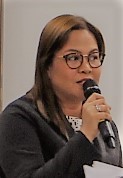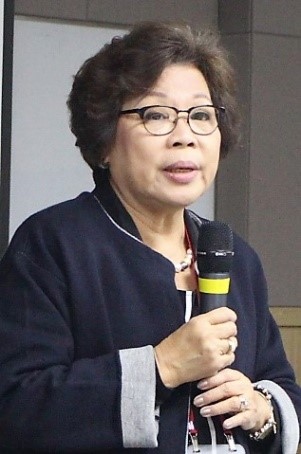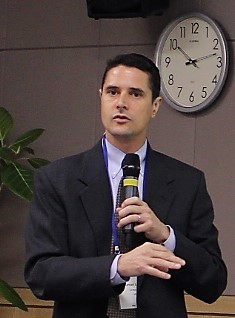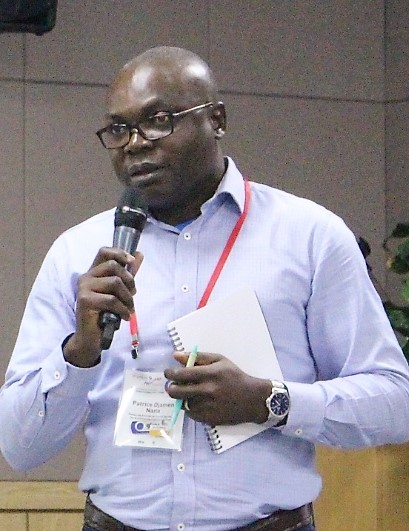The learning event is one of the major project milestones of the IFAD-funded project being implemented by SEARCA titled Supporting Smallholder Farmers in Asia and the Pacific Islands Region through Strengthened Agricultural Advisory Services (SAAS).
 Ms. Nancy M. Landicho, Program Specialist and Officer-in-Charge of the Project Development and Technical Services (PDTS), delivered the message of Dr. Fernando C. Sanchez, Jr., Chair of SEARCA’s Governing BoardThe workshop commenced with a short message from Dr. Fernando C. Sanchez, Jr., Chair of the SEARCA Governing Board, which was delivered by Ms. Nancy M. Landicho, Program Specialist and Officer-in-Charge of the Project Development and Technical Services (PDTS). In his message, Dr. Sanchez underscored the importance of the MEALS framework given that the SAAS Project is going into its final year. It will also help guide project implementation and ensure that project initiatives are on track in achieving the goals and targets that were outlined at inception.
Ms. Nancy M. Landicho, Program Specialist and Officer-in-Charge of the Project Development and Technical Services (PDTS), delivered the message of Dr. Fernando C. Sanchez, Jr., Chair of SEARCA’s Governing BoardThe workshop commenced with a short message from Dr. Fernando C. Sanchez, Jr., Chair of the SEARCA Governing Board, which was delivered by Ms. Nancy M. Landicho, Program Specialist and Officer-in-Charge of the Project Development and Technical Services (PDTS). In his message, Dr. Sanchez underscored the importance of the MEALS framework given that the SAAS Project is going into its final year. It will also help guide project implementation and ensure that project initiatives are on track in achieving the goals and targets that were outlined at inception.
 Dr. Virginia R. Cardenas, Asia Pacific Islands Rural Advisory Services (APIRAS) Regional Coordinator, briefly discussed the objectives of the learning event and also recognized and introduced the participants during the opening program.Dr. Virginia R. Cardenas, Asia Pacific Islands Rural Advisory Services (APIRAS) Regional Coordinator, briefly discussed the objectives of the learning event and also warmly welcomed the delegates as she introduced them one by one. Dr. Cardenas also facilitated the discussion during the workshop.
Dr. Virginia R. Cardenas, Asia Pacific Islands Rural Advisory Services (APIRAS) Regional Coordinator, briefly discussed the objectives of the learning event and also recognized and introduced the participants during the opening program.Dr. Virginia R. Cardenas, Asia Pacific Islands Rural Advisory Services (APIRAS) Regional Coordinator, briefly discussed the objectives of the learning event and also warmly welcomed the delegates as she introduced them one by one. Dr. Cardenas also facilitated the discussion during the workshop.
During the first part of the program, Dr. Kevan Lamm, Assistant Professor for Agriculture, Leadership, Education and Communication at the University of Georgia (Extension), presented the Common Training Needs of APIRAS at the Regional Level, which was an offshoot of the 2017 assessment he conducted across networks, which included APIRAS, the Pacific Islands Rural Advisory Services (PIRAS), and the Agricultural Extension in South Asia (AESA).
 Dr. Kevan Lamm, Assistant Professor for Agriculture, Leadership, Education and Communication at the University of Georgia (Extension)The noteworthy aspect of the result, according to Dr. Lamm, is that there were sometimes differing levels of capacity across the networks for the same competency. This result indicates that one of the primary training needs within the overall APIRAS network is a harmonization of existing competency awareness across all constituent member networks and country fora.
Dr. Kevan Lamm, Assistant Professor for Agriculture, Leadership, Education and Communication at the University of Georgia (Extension)The noteworthy aspect of the result, according to Dr. Lamm, is that there were sometimes differing levels of capacity across the networks for the same competency. This result indicates that one of the primary training needs within the overall APIRAS network is a harmonization of existing competency awareness across all constituent member networks and country fora.
Dr. Lamm further noted that the results of the assessments also indicate that many of the issues that extensionists confront are localized. This means a common training need across the region is not technical, but a functional competency framework upon which the technical expertise resides.
The training design applies self-directed learning approach. However, considering the regional diversity and the varied capabilities of countries across the Asia-Pacific region to impart the various competencies required under various Rural Advisory Services activities, members of the APIRAS Steering Committee agreed to take off with a trainers' training that will facilitate the re-skilling of regional and subregional trainers in the Asia-Pacific region.
 Dr. Patrice Djamen Nana, Agronomist, Socio-Economist, and Expert in Facilitating Innovation ProcessesOn the other hand, Dr. Patrice Djamen Nana, Agronomist, Socio-Economist, and Expert in Facilitating Innovation Processes, discussed the guidelines in developing MEALS that would enable the Project and APIRAS Network to:
Dr. Patrice Djamen Nana, Agronomist, Socio-Economist, and Expert in Facilitating Innovation ProcessesOn the other hand, Dr. Patrice Djamen Nana, Agronomist, Socio-Economist, and Expert in Facilitating Innovation Processes, discussed the guidelines in developing MEALS that would enable the Project and APIRAS Network to:
- Monitor results at varying levels, that is, outputs, objectives and goals level
- Address some of the nuances of the log frame that were identified during the inception report
- Provide information on baseline state of indicators and preferred target state
- Suggest additional accessible sources of information to support baseline information, and
- Identify who will undertake the monitoring and evaluation at the various levels of implementation as well as the project phases
Dr. Djamen steered the discussion using the following questions:
- Who are the major stakeholders and what are their roles/levels of importance?
- What MEALS information do they need?
- How will they use that information (and for what purpose)?
- When do they need the information and in what format?
By December 2018, Dr. Djamen is expected to present the final MEALS with consolidated inputs from the SAAS project partners.
The IFAD SAAS Project Management Office (PMO) was represented by Mr. Glen A. de Castro, Project Coordinator, and Ms. Ana Kristina M. Aquino, Project Assistant.
